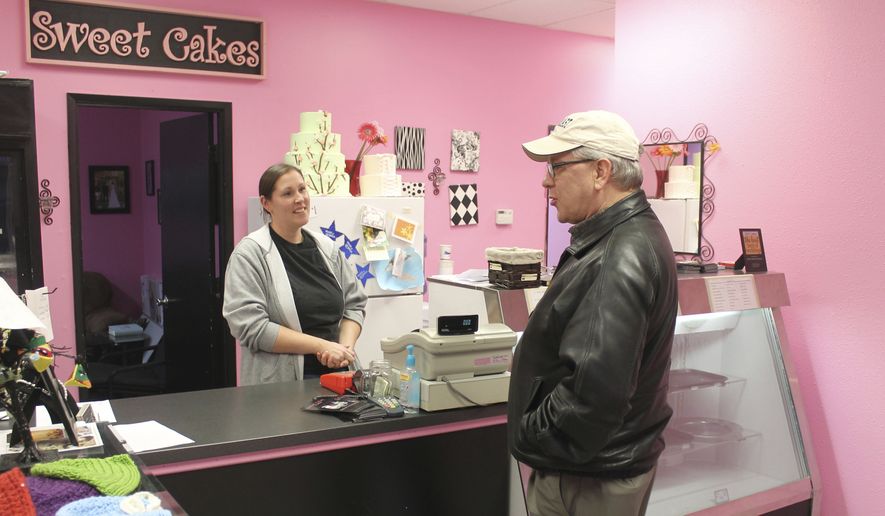The Supreme Court’s ruling in June favoring a Christian web designer who took issue with creating same-sex wedding websites didn’t settle all matters for religious objectors. Legal experts say bakers, florists and others still might have to battle in court if LGBTQ celebrations conflict with their beliefs.
Web designer Lorie Smith said her websites are speech and the First Amendment protects her decisions about creations.
She challenged a Colorado public accommodations law that protects certain groups from discrimination, including those based on sexual orientation.
In a 6-3 decision, the high court ruled that artists can refuse work that would violate their beliefs. The majority of justices reasoned that the First Amendment trumps public accommodation laws.
The case turned on whether creative businesses are “speaking” when they take jobs or whether they are providing services.
That means bakers, florists and other wedding-related businesses that object to participating in LGBTQ ceremonies might have to go to court.
“Courts will now have to determine what kinds of business and professional activities qualify as expressive activity,” said Curt Levey, president of the Committee for Justice. “The court mentioned artists, movie directors and speechwriters, but outside of those professions, there’s plenty of room for disagreement.”
Mr. Levey said the Colorado attorney general and officials in other liberal-leaning states might test the boundaries of the high court’s ruling in favor of Ms. Smith.
Adam Feldman, a Supreme Court scholar and creator of the Empirical SCOTUS blog, said courts will weigh what exactly is expressive or creative enough to object to LBGTQ weddings. He said more clarity is needed.
“The justices like to create clear lines in some cases,” Mr. Feldman said, “but sometimes they do things incrementally, and that is what I see in this case.”
All states protect against discrimination based on race, gender and religion, according to the National Conference of State Legislatures, but they vary on protections for other categories such as disability, age and sexual orientation.
After Ms. Smith’s win, Colorado Attorney General Philip J. Weiser vowed to penalize those trying to “roll back” anti-discrimination laws.
The Supreme Court heard a case against the Colorado Civil Rights Commission five years ago. The commission sued baker Jack Phillips for declining to bake a wedding ceremony cake for a same-sex couple.
The commission said Mr. Phillips was refusing a service in violation of Colorado’s public accommodations law. Mr. Phillips argued that his cakes amounted to First Amendment speech and that forcing him to create a cake for a same-sex wedding violated his religious rights.
The Supreme Court ruled that the commission showed undue animosity toward Mr. Phillips and sent the case back to a lower court, but the justices shied away from a broad ruling on constitutional principles.
The issue percolated without further guidance until Ms. Smith brought her case to the high court.
Kristen Waggoner, leader of Alliance Defending Freedom, represented Mr. Phillips and Ms. Smith. She said the ruling on wedding websites will help the baker as he continues legal battles over custom cake designs.
“States like Colorado cannot eliminate beliefs they do not like,” Ms. Waggoner said. “It’s a broad ruling. We are thrilled.”
The alliance also cites Ms. Smith’s victory in pending circuit court cases involving photographers in Kentucky and New York.
Mr. Weiser’s office didn’t immediately comment on Mr. Phillips’ case or the impact of Ms. Smith’s legal victory.
Mr. Phillips’ litigation is pending. His refusal to create a custom cake to celebrate a gender transition has drawn more scrutiny.
Melissa Klein and her husband, Aaron, owned Sweet Cakes by Melissa in Gresham, Oregon. They served all customers without discrimination until 2013, when repeat customers approached them about a custom cake to celebrate the wedding of a lesbian couple.
Citing their faith and the Bible’s teaching against homosexuality, they refused. The lesbian couple filed a complaint with the state of Oregon, which imposed a $135,000 fine against the Kleins.
After the Supreme Court handed down its ruling for Ms. Smith, the justices told the lower court in the Klein litigation to reconsider that dispute.
A gay couple in Washington state sued florist Barronelle Stutzman after she refused to design arrangements for their ceremony. She settled the dispute after years of litigation, retiring and paying the men $5,000.
Carolyn Shapiro, a co-director of the Institute on the Supreme Court of the United States at Chicago-Kent College of Law, said the next step for courts is to explore whether cakes and flowers qualify as expressive speech.
“We are definitely going to see other types of businesses in court,” Ms. Shapiro said. “A lot of those questions are completely unresolved by [Ms. Smith’s] case.”
• Alex Swoyer can be reached at aswoyer@washingtontimes.com.




Please read our comment policy before commenting.